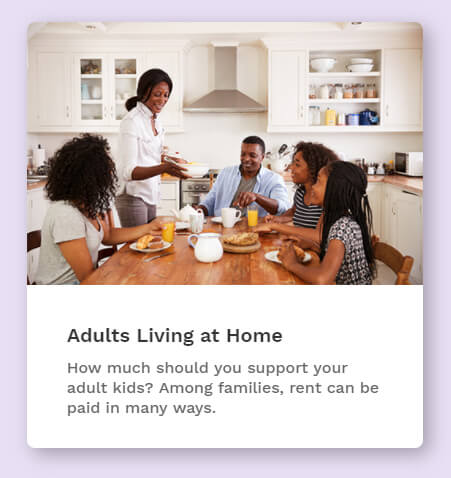How to Pay Off and Make Joint Debts Work
You opened a joint account with the best intentions: to help your child as they started university, to rebuild credit for a struggling sibling, or to combine finances with your spouse.
But joint debts — from lines of credit, to credit cards and other loans — are a major commitment and should be carefully considered. While you may be co-signing or even just acting as a guarantor, you’re agreeing to shoulder the responsibility and liability for the full loan, too.

Both parties share the responsibility of the account and any outstanding balances until it’s fully paid off and closed. Defaulting on a loan or any missed and late payments affect both of your credit scores, too.
With the stakes so high, here’s what to keep in mind to make sure you’re making joint debts work while safeguarding your finances.
Define Your Agreement
You need to determine what your goals are for this joint account — the purpose, the duration, when to review the status, and who is responsible for making and staying on top of payments.
Parents may want to reiterate that a joint credit card for their kids is for textbooks and school supplies, not beer and concert tickets, for example. Make it clear that the joint account would be open for one school year then closed, so your kids aren’t caught off guard and understand the terms.
You may want to touch base to see how both parties are faring at the three, six, and 12-month mark. If you find something isn’t quite working the way you agreed upon initially, it may be time to tweak the ground rules.
This is a crucial conversation that’s worth putting in writing, so you can both refer to it when confusion arises.
Stick to a Payment Plan
One or both parties may be making payments on the card, depending on the spending. This is another conversation that all account holders involved need to have.
If you’re a couple, divvying up costs may be different compared to a parent-child relationship. In other instances, a family member may be co-signing but their loved one is in charge of making all payments.
Ensure both parties know what the due date is for all payments, and agree on the small details so account holders are comfortable with the arrangement. This could mean that receipts of payment are forwarded to each other, for example.
Communicate and Keep Tabs
Do your homework before cosigning by going over your cosigner’s income, budget to cover off the loan and ability to manage the debt they may incur.
You have to feel confident in their ability to manage the finances tied to the joint account that you’ve both agreed to.
Then you have to monitor the account — check in on their spending so there isn’t any sticker shock when a credit card statement comes in. If he or she is using the card to book a trip, for example, set house rules so that they give you a head’s up about how they plan to pay it off.
Ultimately, it’s both parties’ jobs to stay on top of the account and make sure it’s being used responsibly. The one with more skin in the game — such as the parent, or the guarantor — may have to keep a watchful eye, though.
Ask for Separate Statements
Even if you live in the same household and have equal access to the account, you can ask for separate copies of your joint credit card or line of credit statement. This is a good idea so you can double check that payments are being made.
Start Small
If you’re hesitant to open a joint account, act as a guarantor, or cosign, take baby steps. This could mean opening a credit card with a very small limit, such as $300 to test the waters. In other cases, it could mean asking your loved one to open a secured credit card for a few months to prove they can responsibly manage their money.
Build Your Autonomy
If the purpose of the joint account or loan is to help someone, that person should be careful to not make the joint account their sole account, credit card, or loan. If you’re leaning on a friend or family member to co-sign on an account, you should consider it as more of a stepping stone to pave the way to a credit card or loan with only your name tied to it.
This way, if things don’t work out and the joint account is severed, you won’t be left starting from scratch all over again. You’ll have a second account and its history to fall back on.
One additional thing to be aware of with joint accounts is that sometimes loans and lines of credit only report on the credit report of the person who is listed first on the account. So if part of the purpose behind a joint loan or line of credit is to help someone establish credit, their name should be put first on the account to make sure that they get full credit for it on their credit report.
Create an Exit Strategy
Perhaps you or your loved one no longer needs the joint account, it’s time to sever financial ties carefully.
For starters, the account balance needs to sit at $0. You’ll have to ensure both parties pay their share of the debts as agreed and on schedule.
After that, determine if both parties will want to close the account or if one party wants to remove their name from the account.
Before removing anyone’s name from the account, make sure they have another account to work from – if they need it – before removing their name from the joint one.
Prepare to Shoulder the Debt
Whatever the limit is on a joint credit card or line of credit or the payment is on a joint loan, make sure you have the ability to either pay off the debt or take over the payments if your family member or friend bails out or for some reason is no longer able to hold up their side of the deal. It might surprise you to learn that 50% of all bank co-signed loans result in the co-signer making payments, and when the loan is done through a finance company, the co-signer ends up making payments 75% of the time.
Co-signing is risky business. If you don’t have the financial capability to fully take on the joint debt if the other person stops paying, then don’t enter into the arrangement. You should also consider what will happen to your relationship with the other person if this joint account doesn’t work out well. Are you willing to risk the relationship, or if you are guaranteeing the debt, are you willing to pay it off yourself and try to save the relationship. Even if you take the high road, help the other person out, and pay off their debt, the relationship may still sour if the other person feels embarrassed, ashamed, or finds fault with you rather than being thankful for your help. These things happen, and you should think this through carefully before heading down this path.
Seek Credit Counselling Help
If in the end it turns out that you and your loved one are both losing control of your finances tied to this joint account, your best move would be to get professional help from non-profit credit counselling organization like ours.
We can help you create a budget or look at a debt repayment plan or debt consolidation options depending on what your needs are. With our debt repayment program, we can eliminate or drastically lower your credit card interest rates and communicate with your creditors so they understand you’re on the right track to paying off your debts. Give us a call if you need help. We’re here to help you.






0 Comments